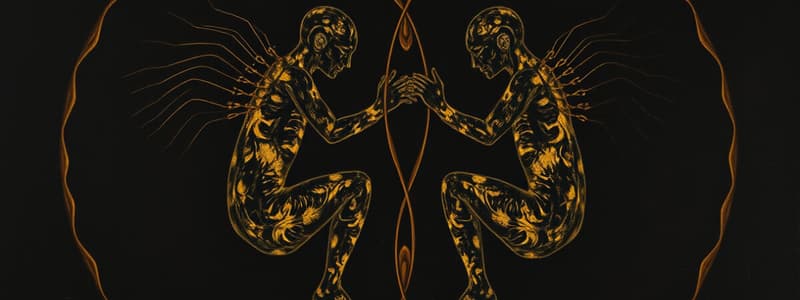Podcast
Questions and Answers
What are sister chromatids?
What are sister chromatids?
What is chromatin?
What is chromatin?
Long strands of DNA found in the eukaryotic cell nucleus
What is the function of the centromere?
What is the function of the centromere?
Holds two sister chromatids together during mitosis
What is cell division?
What is cell division?
Signup and view all the answers
Define mitosis.
Define mitosis.
Signup and view all the answers
What is the cell cycle?
What is the cell cycle?
Signup and view all the answers
What occurs during the G1 phase?
What occurs during the G1 phase?
Signup and view all the answers
What happens in the S phase?
What happens in the S phase?
Signup and view all the answers
What occurs during G2 phase?
What occurs during G2 phase?
Signup and view all the answers
Define the mitotic phase.
Define the mitotic phase.
Signup and view all the answers
What is cytokinesis?
What is cytokinesis?
Signup and view all the answers
What is interphase?
What is interphase?
Signup and view all the answers
Describe prophase in mitosis.
Describe prophase in mitosis.
Signup and view all the answers
What is the centrosome?
What is the centrosome?
Signup and view all the answers
What are spindle microtubules?
What are spindle microtubules?
Signup and view all the answers
What is a kinetochore?
What is a kinetochore?
Signup and view all the answers
Define metaphase.
Define metaphase.
Signup and view all the answers
What happens during anaphase?
What happens during anaphase?
Signup and view all the answers
Describe telophase.
Describe telophase.
Signup and view all the answers
What is a cleavage furrow?
What is a cleavage furrow?
Signup and view all the answers
What is a cell plate?
What is a cell plate?
Signup and view all the answers
What does the cell cycle control system do?
What does the cell cycle control system do?
Signup and view all the answers
Define a tumor.
Define a tumor.
Signup and view all the answers
What is a somatic cell?
What is a somatic cell?
Signup and view all the answers
Define sex chromosomes.
Define sex chromosomes.
Signup and view all the answers
What are autosomes?
What are autosomes?
Signup and view all the answers
What does diploid mean?
What does diploid mean?
Signup and view all the answers
Define haploid.
Define haploid.
Signup and view all the answers
What are gametes?
What are gametes?
Signup and view all the answers
What is fertilization?
What is fertilization?
Signup and view all the answers
Define a zygote.
Define a zygote.
Signup and view all the answers
What is meiosis?
What is meiosis?
Signup and view all the answers
Describe prophase 1 in meiosis.
Describe prophase 1 in meiosis.
Signup and view all the answers
What happens during metaphase 1 in meiosis?
What happens during metaphase 1 in meiosis?
Signup and view all the answers
Define homologous chromosomes.
Define homologous chromosomes.
Signup and view all the answers
What are homologs?
What are homologs?
Signup and view all the answers
What occurs during anaphase 1 in meiosis?
What occurs during anaphase 1 in meiosis?
Signup and view all the answers
Describe telophase 1 in meiosis.
Describe telophase 1 in meiosis.
Signup and view all the answers
What happens during cytokinesis in meiosis?
What happens during cytokinesis in meiosis?
Signup and view all the answers
What is meiosis II?
What is meiosis II?
Signup and view all the answers
Define a tetrad.
Define a tetrad.
Signup and view all the answers
What is crossing over?
What is crossing over?
Signup and view all the answers
What is a karyotype?
What is a karyotype?
Signup and view all the answers
What is nondisjunction?
What is nondisjunction?
Signup and view all the answers
Study Notes
Cell Division Terminology
- Sister Chromatid: Identical halves of a duplicated parent chromosome, linked by a centromere.
- Chromatin: Long, unwound strands of DNA in eukaryotic nuclei that condense to form chromosomes.
- Centromere: The chromosome region that holds sister chromatids together during mitosis.
- Cell Division: The process where a single cell divides into two new daughter cells.
- Mitosis: A type of cell division resulting in two nuclei, each having the same number of chromosomes as the original cell.
- Cell Cycle: A series of events that govern cellular growth and division, consisting of various phases.
Cell Cycle Phases
- G1 Phase: The first growth phase where the cell grows and synthesizes proteins.
- S Phase: The phase where the cell replicates its chromosomes while continuing to grow.
- G2 Phase: A second growth phase, where the cell prepares for division by synthesizing necessary components.
- Mitotic Phase: The active phase of the cell cycle where the cell undergoes division.
- Interphase: The period when the cell is not dividing, but preparing for division.
Mitosis Stages
- Prophase: Chromatin condenses into chromosomes; the nuclear envelope disintegrates and centrosomes move apart.
- Metaphase: Chromosomes align at the metaphase plate in the cell's center, connected to spindle fibers.
- Anaphase: The centromeres split, separating sister chromatids that move to opposite poles; the cell elongates.
- Telophase: Nuclear membranes form around each chromosome set, marking the end of mitosis.
Cytokinesis
- Cytokinesis: The division of the cytoplasm during the cell cycle, leading to the formation of two separate daughter cells.
- Cleavage Furrow: The first sign of cytokinesis in animal cells, forming a groove at the cell surface.
- Cell Plate: A structure that forms during cytokinesis in plant cells, leading to new cell wall formation.
Genetic Terminology
- Somatic Cell: Any non-reproductive cell in an organism.
- Sex Chromosomes: One of the 23 pairs of human chromosomes that determine an individual's sex.
- Autosomes: Chromosomes that are not involved in determining sex.
- Diploid: Cells possessing two sets of chromosomes.
- Haploid: Cells containing one complete set of chromosomes.
- Gametes: Reproductive cells (sperm and egg) that are haploid.
- Fertilization: The process of combining male and female gametes to form a zygote.
- Zygote: The fertilized egg resulting from the union of gametes.
Meiosis
- Meiosis: A specialized type of cell division to produce gametes, resulting in cells with half the chromosome number of the original cell.
- Prophase I: Chromosomes condense and double; homologous chromosomes pair and may undergo crossing over.
- Metaphase I: Homologous chromosome pairs align along the cell's midline, connected by spindle fibers.
- Anaphase I: Homologous chromosomes separate, with both members moving to opposite poles.
- Telophase I: Chromosomes reach the cell poles; cytokinesis results in two daughter cells.
- Meiosis II: The second division reducing cells further, halving the chromosome number again.
Genetic Variability
- Tetrad: A group of four chromatids formed during prophase I of meiosis.
- Crossing Over: The exchange of genetic material between homologous chromosomes during prophase I, increasing genetic diversity.
- Karyotype: An arrangement of chromosomes in a cell, used to visualize chromosomal abnormalities.
- Nondisjunction: The failure of homologous chromosomes to separate during meiosis, potentially leading to genetic disorders.
Studying That Suits You
Use AI to generate personalized quizzes and flashcards to suit your learning preferences.
Description
Test your knowledge on key concepts related to mitosis and meiosis with these flashcards. Each card provides a definition of essential terms such as sister chromatids, chromatin, and centromeres to enhance your understanding of cell division processes.




